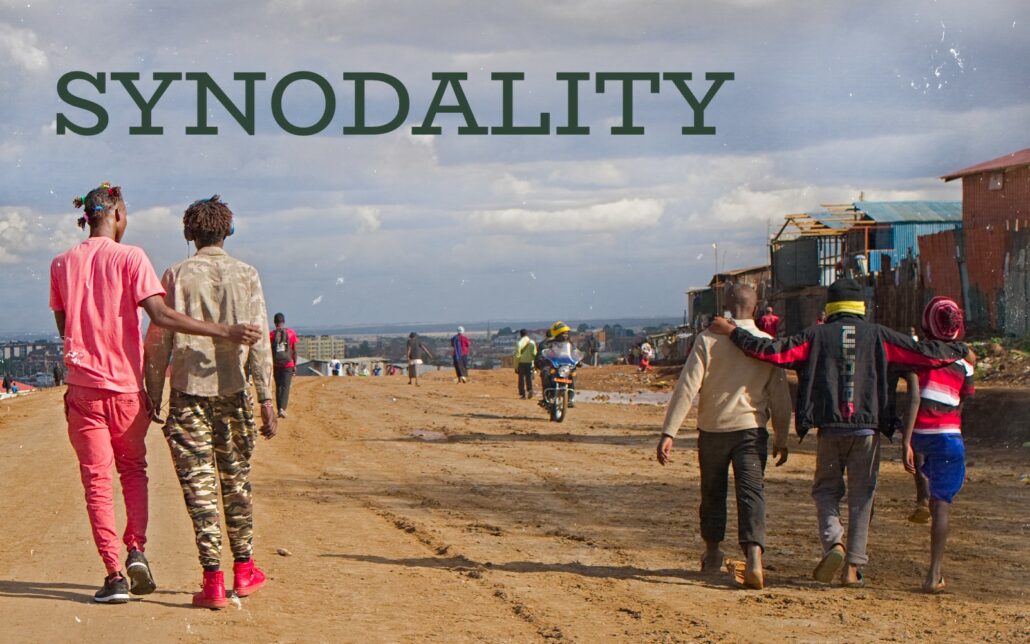See. Do. Be. Free.

Issue 004
An Open Letter to the Community around this year's theme.
Greetings,
Each year we pick a theme to help guide our work of freeing leaders who help create cities of peace for all people, where everyone belongs, especially the most vulnerable.
Our theme this year is synodality.
It’s a term made popular by Pope Francis as part of a two year “synod on synodality” that began in October 2021 and ends October 2023. It’s an unprecedented and hugely ambitious attempt to engage all 1.2 billion Catholics from around the world.*
The word synod is not unique to Catholics. It is derived from the Greek word, synodos which is commonly translated as “assembly” or “meeting.” It refers to a form of church government shared also by protestant and orthodox churches. Synods gather church leaders to discuss important issues to the life and mission of the church.
At first glance, it sounds like a monumentally bad idea to host a synod on synodality. It’s like having a conference on how to have a conference.
Painful!
But a closer look reveals something else – something much more daring and creative. The synod on synodality is not really a conference at all. It is an attempt to recover the original meaning of the word buried under nearly 2,000 years of ecclesial accretion and bureaucratic plaque.
Synod literally means to “walk together.”
The synodal path is not about church meetings. It’s not about debating this or that issue. It’s about walking together into an open-ended adventure led by the Spirit, encountering real people along the way, and finding new ways of relating that bring life and light, and meaning. It’s about journeying together into the future with others who are different from us. As it turns out, synodality is core to the genius of Jesus.
Jesus’ preferred method of transformation is not to host a church council that studies the problems plaguing humanity. His preferred method of transformation is to go for a walk. He invites us to join him on a long walk to undergo the human experience together and learn what it means to be loved, come what may.
When Jesus says to his disciples, “Follow me” he is modeling for us the synodal path of the Gospel, of reality itself. In Christ, God enters human history and walks with us throughout the whole of the human experience. The invitation of the Gospel is to walk with the God who walks with us. And here’s the real kicker – to walk with those who are different from us. Think about it. Who would ask a radical like Simon the Zealot (anti-establishment left) to walk with a tax collector like Matthew (pro-establishment right)? Who would ask working-class fishermen like Peter and John to walk alongside someone like Bartholomew who, according to tradition, descended from royalty? And who insists on inviting a treasurer turned traitor to help form a community that would one day change the world? Who does that?
When I think of the social fragmentation happening in our world, the synodal journey has never been more important.
Just last year, a report by the U.S. National Intelligence Council highlighted the consequences of “social fragmentation” on a global scale. The report cites the growing “trust gap” between the people and the institutions that serve the common good. It notes the deep and growing skepticism that is making our world more unstable and volatile. It notes how the Coronavirus has revealed both the interconnectedness of the global community as well as our shared vulnerability. It recognizes the climate crisis that transcends all borders. It even points to the social media algorithms that isolate us into smaller and smaller tribal affiliations that produce increasingly louder echo chambers that further erode public trust. Add this together and we have the recipe for “social fragmentation” and the “erosion of democracy” as we know it.
I am not a doom and gloom futurist, but it seems clear to me that either we learn to journey together across differences, or our differences will consume us.
And so this year we will not only explore the various aspects of synodality, we will practice what it means to walk together as we do our part to help create cities of peace for all people, where everyone belongs, especially the most vulnerable.
None of this should seem new. We have been practicing the art of synodality at Street Psalms for nearly 25 years. Without a doubt, some of my favorite memories are simply walking the streets of our cities together, encountering, listening, discerning, and dreaming together, all while being inducted into something none of us could fully imagine. Our entire methodology of formation could be summed up by the word, synodality. My prayer is that we continue to undergo the invitational, inductive, dynamic, and hugely open-ended adventure together, not in spite of our differences, but because of them. We are not doing this through dry church councils, public debates, or clever arguments. We are doing this by walking together.
If you are not already doing this, consider taking up the synodal practice of walking this year, perhaps just a mile or two a few times a week, perhaps with someone who is different from you.
Let’s walk together with the God who walks with us and see where the road takes us.
Peace,
Kris Rocke
Executive Director
*The synod on synodality in the catholic church is historic in that it inverts the normal process of synods. Synods have always been reserved for religious professionals – the curia. It is typically top-down. In this case, synodality inverts the process. It begins at the local level of 1.2 billion parishioners. It will then move up to the national level and then finally, the international level gathered in Rome. And here’s the other shocking rule that Pope Francis insisted on. There is nothing that can’t be discussed! That makes for an interesting walk!
